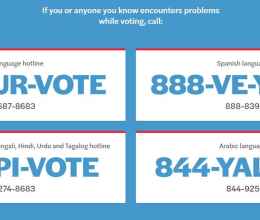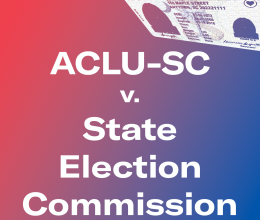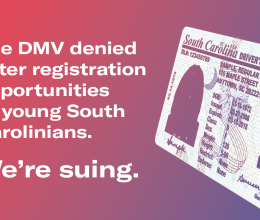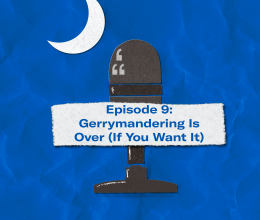
Aiken Standard
By Rob Novit – Staff writer
September 21, 2012. Aiken. Six weeks before the November general election, the existing voter ID law in South Carolina remains in effect, Victoria Middleton, executive director of the S.C. ACLU office, said at an Aiken County Democratic Party meeting on Thursday.
New voter ID legislation, which Middleton calls far more stringent, was approved by the S.C. General Assembly in 2011. It was then rejected by the U.S. Justice Department later that year as discriminatory against minorities.
The State of South Carolina has appealed that decision, and the case is now before a three-judge federal panel in Washington, D.C. The ACLU is among the parties asking the panel to uphold the Justice Department’s action
Middleton said she can’t predict what the panel will decide. But still up in the air as well is whether the State Election Commission and county election offices could implement the new law in time for the general election if the judges uphold it.
“Because of a history of discrimination against some voters,” Middleton said, “it’s important to ensure the right to vote is fully protected.”
Current South Carolina does not require photo identification; a voter registration card without a picture will suffice. That would change under the new law.
Middleton said the ACLU and other organizations throughout the country didn’t envision the efforts to suppress voting rights in the past three years. In 2008, about 5 million people voted who had not done so previously. Since then, state legislatures have passed or are attempting to pass laws that could impact or disenfranchise voters is the same number of people, Middleton said.
She estimates that 200,000 South Carolinians could be impacted, because they could not obtain a photo ID that would pass muster with the new law. About 82,000 of those residents are minorities, while the rest include elderly white residents and students.
“The state has not produced a shred of evidence of voter impersonation fraud,” Middleton said.
The ACLU and other opponents of the new law can only specifically object to minority discrimination through the federal Voting Rights Act that impacts some Southern states with a history of discrimination.
No one has claimed widespread voter fraud until the current election cycle, said Moses Mims, the communications officer for the county party.
“All these laws passed in the last three years have been designed to suppress the vote and skew the elections in favor of (Mitt) Romney,” Mims said.
That’s not true, said S.C. Rep. Bill Taylor, R-Aiken, who voted in favor of the new ID law in 2011.
“Everybody says they want clean elections that are accurate,” he said in a telephone interview earlier on Thursday. “We have to show a photo ID for most of the things we have do to. Polls in South Carolina show that 80 percent say they are in favor of a photo ID There’s just a handful of people who want to make this a partisan issue.”
Taylor cited a recent Pew Center for the States’ survey that indicate widespread flaws in the voting process throughout the country and some 2 million people on the voting rolls that are dead.
While there are human errors in elections, no dead people are going to show up to vote, one person said at the meeting. Further, there is nothing to suggest that voting irregularities are an indication of deliberate fraud, others said.
Also supporting the new voter ID law is S.C. Rep. Tom Young, R-Aiken.
“I don’t think it is an inconvenience to have to show a photo ID before voting,” he said, also in a telephone interview. “I’ve had some folks who have contacted me. To ensure their right to vote, I have assisted these people in getting them an ID with the appropriate agencies in the state. My hope is that the S.C. ID law will be upheld. If not, I hope they will tell us how we can fix it.”
Ann Willbrand, a Democratic Party vice chairman, said she has never seen any indication of impropriety at local elections. The elections office formally checks IDs under the existing law and runs clean elections, she said.
“I’ve been to many public forums with election commissioners saying they had never seen voter impersonation or other fraud happen,” said Middleton.
Mims said his own sister, born at home in the 1950s, has nothing on file with the state.
“People who support this law don’t realize how many people don’t have birth certificates and can’t get them,” he said. “It’s not a straightfoward thing.”






